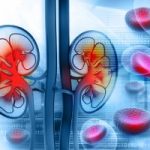
Benign prostatic hyperplasia (BPH) – enlarged prostate – can raise the risk of chronic kidney disease (CKD). BPH is an enlarged prostate that is not cancerous. In males, the prostate goes through two growth periods, once during early puberty and again around the age of 25. As the prostate enlarges the gland can press and pinch the urethra and the bladder walls become thicker. Over time the bladder can become weaker and lose its ability to fully empty. If the urethra continues to narrow and the bladder maintains the inability to fully empty, it can lead to complications associated with benign prostatic hyperplasia.
Various studies link benign prostate hyperplasia to chronic kidney disease
Advertisement
 Numerous studies have linked BPH with an increased risk of kidney disease. Much research has revealed complications associated with BPH obstruction as well as chronic kidney disease. Andrew Rule, M.D., specialist at the Mayo Clinic, said, “Several studies show men with chronic kidney disease have increased chance of death, hospitalization and cardiovascular events.”
Numerous studies have linked BPH with an increased risk of kidney disease. Much research has revealed complications associated with BPH obstruction as well as chronic kidney disease. Andrew Rule, M.D., specialist at the Mayo Clinic, said, “Several studies show men with chronic kidney disease have increased chance of death, hospitalization and cardiovascular events.”
Epidemiologist Dr. Steven Jacobsen added, “We were surprised at how much kidney disease can be attributed to BPH. An obstruction on the urethra is like a dam on a river – men can still void, but the constant build-up and pressure will ultimately cause damage.” BPH affects 90 percent of males in their 70s and 80s.
Other research that analyzed the relationship between BPH and kidney disease revealed an enlarged prostate will almost always contribute to bladder obstruction, which impairs the function of the kidneys. The link comes from the residual urine that remains in the body when the bladder cannot be fully emptied.
Difference between benign prostatic hyperplasia and prostate cancer
Benign prostatic hyperplasia is a non-cancerous growth of the prostate and it does not increase a man’s risk of developing prostate cancer. Prostate cancer begins in the outer peripheral zone and grows outward to invade surrounding tissue. In BPH, the growth moves inward towards the prostate’s core, causing the urethra to become tighter and making it difficult to urinate.
The way BPH and prostate cancer grow determines their symptoms. BPH can have annoying symptoms, such as the inability to urinate or only being able to release a small amount. Prostate cancer is referred to as a silent killer because its symptoms can take months or years to even appear.
Causes and symptoms of benign prostatic hyperplasia
 Changes in hormones that occur through aging are what contribute to BPH. Genetics, too, can be a possible cause for BPH. The prostate continues to grow from the age of 25, but when the prostate becomes too enlarged it can cause complications in older men.
Changes in hormones that occur through aging are what contribute to BPH. Genetics, too, can be a possible cause for BPH. The prostate continues to grow from the age of 25, but when the prostate becomes too enlarged it can cause complications in older men.
Symptoms of BPH include:
- Difficulty urinating
- Constant urge to urinate
- Increased urination at night
- Weak urine stream
- Dribbling at end of urination
- Straining while urinating
- Inability to empty bladder fully
Enlarged prostate diet tips
Food and diet can play a role in keeping your prostate healthy. Here is a list of certain foods that can provide your body with the essential nutrients it needs for a healthy prostate.
- Watermelon
- Tomatoes
- Grapefruit
- Papaya
- Red berries
- Green leafy vegetables
- Red wine – in moderation
- Black tea
- Broccoli
- Onions
- Citrus fruit
- Raspberries
- Broccoli
- Eggs
- Flaxseed
- Cod liver oil
- Halibut
- Liver
- Low-fat dairy
- Peanuts
- Roasted almonds
- Salmon
- Skinless poultry
- Tuna
- Wheat germ
There are some foods that you should avoid if you have concerns about your prostate. Processed foods, animal-based products, and refined grains and carbohydrates can all contribute to an enlarged prostate and don’t offer the essential nutrients you require. Minimizing or avoiding these foods altogether is a good start when planning your prostate-friendly diet.
Other tips to consider when beginning a prostate diet are:
- Have at least five servings of fruits and vegetables daily.
- Choose whole grains.
- Reduce intake of red meat or processed meat.
- Choose healthy fats, such as avocado and olive oil.
- Avoid sugary foods and beverages.
- Reduce salt intake.
- Control your portion size.
Enlarged prostate treatment and prevention
 Depending on the size of the prostate and the symptoms associated with it, there are many different treatment options available, for example:
Depending on the size of the prostate and the symptoms associated with it, there are many different treatment options available, for example:
- Medications
- Surgery
- Transurethral resection of the prostate (TURP) – a scope removes the center of the prostate only leaving the outside
- Transurethral incision of the prostate (TUIP) – cuts are made in the prostate gland to allow easier urination
- Transurethral microwave thermotherapy (TUMT) – electrodes destroy the inner part of the prostate, shrinking it and improving urination
- Transurethral needle ablation (TUNA) – radio waves destroy excess prostate tissue that block urine flow
- Laser therapy
- Prostate lift
Although you may not be able to prevent your prostate from becoming enlarged, sticking with these habits can help ease symptoms and improve prostate health.
- Reduce beverage consumption in the evening to minimize urge to urinate at night
- Limit caffeine and alcohol
- Go to the bathroom and relieve your bladder the moment you feel the urge
- Urinate at regular times
- Follow a healthy diet
- Exercise
- Keep your body temperature warm – cold temperatures promote urine retention
Other complications of BPH
Aside from difficulty urinating and an increased risk of chronic kidney disease, other complications associated with BPH are:
- Increased risk of death
- Bladder stones
- Urinary tract infections
- Urinary incontinence
- Hematuria – blood in urine
Related Reading:
Advertisement
New technology could help your bladder
We all love movies – it seems like the next big blockbuster is being released every weekend and there are endless lineups just to catch the first glimpse. Although movies can be a great form of entertainment, or a fun date-night idea, they can wreak havoc on your bladder. Continue reading…
Your overactive bladder is robbing you of this…
Ever find yourself bolting to the closest bathroom because you’ve just got to go? Roughly 13 million people have some sort of bladder-related problem, including the urgency to go. This condition is called overactive bladder (OAB) and it can wreak havoc on your life. Continue reading…
Sources:
http://www.niddk.nih.gov/health-information/health-topics/urologic-disease/benign-prostatic-hyperplasia-bph/Pages/facts.aspx
http://www.sciencedaily.com/releases/2005/06/050629071621.htm
http://cdn.intechopen.com/pdfs-wm/32321.pdf
http://www.cancer.gov/types/prostate/understanding-prostate-changes#enlarged-prostate
http://www.pcf.org/site/c.leJRIROrEpH/b.5780045/k.3758/Benign_Prostatic_Hyperplasia_BPH.htm
http://www.diethealthclub.com/health-issues-and-diet/prostate-disorders/diet.html
http://www.health.harvard.edu/healthbeat/10-diet-and-exercise-tips-for-prostate-health
http://www.mayoclinic.org/diseases-conditions/benign-prostatic-hyperplasia/basics/treatment/con-20030812
http://www.mayoclinic.org/diseases-conditions/benign-prostatic-hyperplasia/basics/lifestyle-home-remedies/con-20030812
http://www.nhs.uk/Conditions/Prostate-enlargement/Pages/Treatment.aspx
